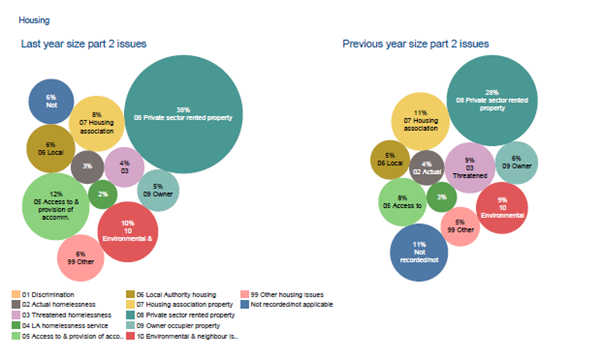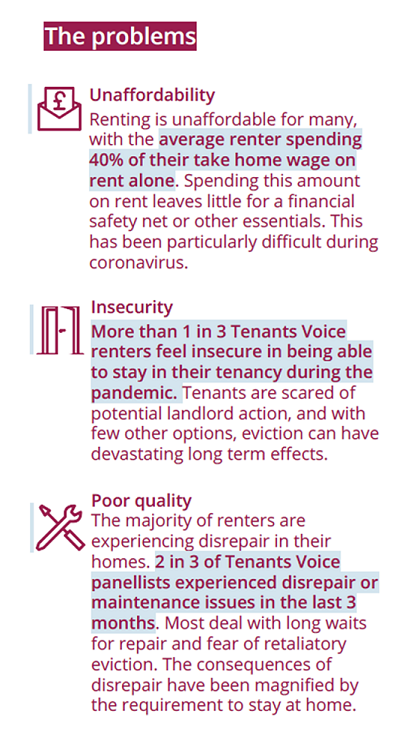The pandemic exacerbated existing problems and created new ones
The coronavirus pandemic has caused huge upheaval to our daily lives. Our health, work, education and social lives have all been affected in ways we would not have thought possible as we entered 2020.
People have been affected in different ways. If you’re young, a person of colour, in a precarious job or in private rented housing you are far more likely to have suffered financially as a result of the crisis.
How the pandemic has exposed the cracks in the private renting sector (PRS)
Financial shocks caused by the pandemic have exposed the unaffordability of renting, and left many in arrears. Renters feel on edge and insecure, fearing the consequences of a missed rent payment or flagging a problem. Tenants don’t want to rock the boat and risk being forced out of their homes, so they put up with enduring disrepair issues.
Private renters needing advice in Wiltshire
The number of people who have turned to Citizens Advice Wiltshire for advice about private rented property has more than doubled in the past year.1
Between 1 April 2020 and 31 March 2021 we helped 2,340 people with more than 5,000 housing problems. Problems with private rented property was the biggest housing issue people sought advice for. More than 1,000 people needed advice and support with almost 2,000 housing problems (1,984), with more than one in four of those people seeking advice about repairs and maintenance of their privately rented property.
These figures don’t include the 100+ people who’ve turned to us for advice because they have rent arrears with a private landlord.

Similar issues faced by renters throughout in England
Financial vulnerability, high rents and income shocks have driven people into arrears
 It has been a difficult financial year for many, with renters being disproportionately impacted. Joseph Rowntree Foundation (JRF) report that before the pandemic, around 35% of private renters worked in the hardest hit sectors (e.g. retail). And, between April and June 2020, 1 in 3 private renter workers were furloughed, losing 20% of their income.2 This, plus the high cost of renting has led to a surge in rental arrears.
It has been a difficult financial year for many, with renters being disproportionately impacted. Joseph Rowntree Foundation (JRF) report that before the pandemic, around 35% of private renters worked in the hardest hit sectors (e.g. retail). And, between April and June 2020, 1 in 3 private renter workers were furloughed, losing 20% of their income.2 This, plus the high cost of renting has led to a surge in rental arrears.
Rent arrears building up
Recent research by Citizens Advice shows the scale of the problem. Around 1 in 3 renters lost income during the pandemic and half a million people in the private rented sector were behind on their rent in January.3
Many will be forced to leave their homes when the current protections for tenants in the private rented sector in England come to an end. Some will be forced to seek help from their local council, placing a huge burden on them at a time when budgets are tighter than ever.
Without further support for renters in England, in the form of grants or interest-free loans to help people repay their covid-related arrears similar to the scheme in Wales, we risk seeing a new wave of problem debt and homelessness.
No-fault evictions
While some renters will be forced to leave their homes as they’re no longer able to afford them, others will be asked to move out through no-fault of their own.
Recent polling commissioned by the Renters’ Reform Coalition indicated that one in 12 private renters had received a no-fault eviction notice, known as a Section 21, since March 2020.
Nearly a third (32 per cent) of the 1,008 people surveyed also said they were concerned about the possibility of their landlord asking them to move out this year.
The government pledged two years ago to end no-fault evictions and in December 2019 it committed to bring forward a Renters’ Reform Bill, but progress has stalled.
Poor quality and disrepair
Many renters are experiencing disrepair or maintenance issues in their homes. This includes dangerous hazards such as exposed wiring and leaking roofs. Often, tenants have long waits to get things fixed, and in some cases the issues are never resolved. During the pandemic, this has been even more difficult for tenants to cope with due to having to stay home.
Private renters are also reticent to raise issues, due to experiences of having rent increased after repairs, and the likelihood of retaliatory eviction.
Between January and February 2021 Citizens Advice were helping 1 renter every minute
In the recent report ‘One renter every minute: How the pandemic exacerbated existing problems and what that means for the Renters’ Reform Bill’4, based on two pieces of research, a Tenants Voice panel and a Coronavirus Harms survey, Citizens Advice makes three key recommendations:
- End 'no-fault' evictions through Section 21, to protect renters from retaliatory eviction and increase their security
- Improved tenancy security through open-ended tenancies, so renters aren't forced into fixed terms or exposed to rent hikes each year.
- Better regulation and oversight to set consistent standards, providing more protection for tenants.
The problems we’ve seen this year aren’t new, and they aren’t going away. Insecurity, unaffordability and poor quality are not new issues within the private renting sector.
They are enduring problems that have huge detrimental impact on renters. The Renters’ Reform Bill is an opportunity to truly reform the sector. It’s a package of reforms planned by Government, that's intended to deliver a fairer and more effective rental market.
The Bill presents a once in a generation opportunity to create a secure, safe and functioning system for renters. We’ve seen this year how close to the wire financially many renters are, exacerbated by the unaffordability of the sector. Even with measures to reform tenancies and prevent no-fault evictions, the affordability of the sector needs to be looked at if we want to give tenants a secure and safe home.
Need advice?
For advice and information call freephone 0800 144 8848 (Monday to Friday, 9am to 5pm),
or contact us for advice by email.
Our face-to-face and drop in services remain temporarily closed, due to COVID-19 (coronavirus). More ways to get advice >
Published May 2021.
Notes
1. Citizens Advice management data
2. JRF, UK Poverty 2020/21 Report, Jan 2021
3. Citizens Advice, New Year Same Arrears, Jan 2021
4. Citizens Advice, One renter every minute: How the pandemic exacerbated existing problems and what that means for the Renters’ Reform Bill, March 2021


